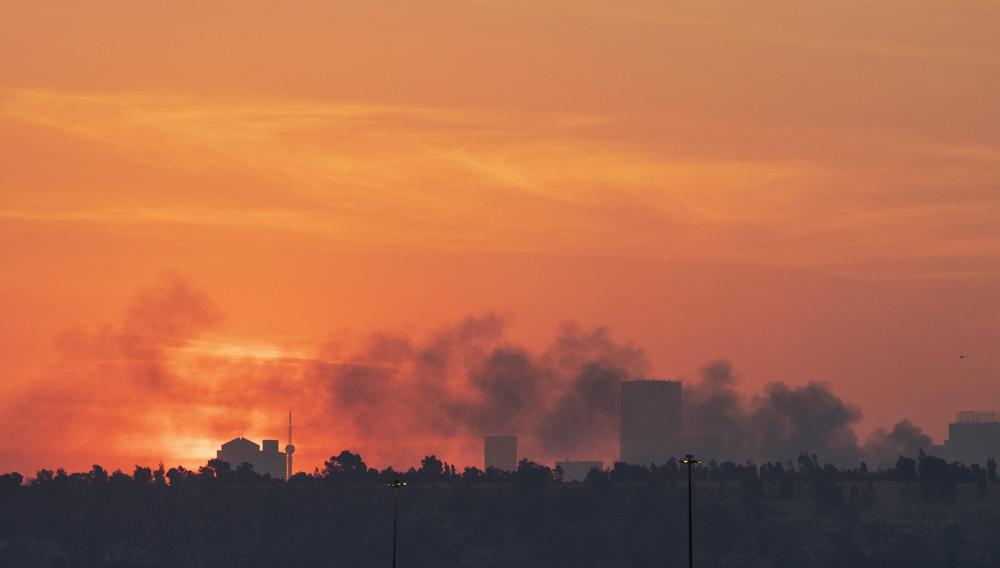

Rioting triggered by the imprisonment of former South African President Jacob Zuma escalated Monday as shopping malls in Johannesburg were looted, major roads were blocked by burning tires and the police and military struggled to contain the violence.
President Cyril Ramaphosa, in a somber address broadcast to the nation Monday night, vowed that the police and army would restore order, and he appealed to all South Africans to work together for peace.
The unrest started last week in KwaZulu-Natal province after Zuma was imprisoned for contempt of court. What began as fairly small-scale blocking of roads in Zuma’s home area intensified and spread to Gauteng, South Africa’s most populous province, including Johannesburg, the country’s largest city.
The South African National Defence Force has been deployed to help the police.
At least 10 people have been killed and more than 490 arrested “in acts of public violence rarely seen in the history of our democracy,” Ramaphosa said.
Without once mentioning Zuma, Ramaphosa said that the “violence may indeed have its roots in the pronouncements and activities of individuals with a political purpose, and in expressions of frustration and anger. However, what we are witnessing now are opportunistic acts of criminality, with groups of people instigating chaos merely as a cover for looting and theft.”
He said the root cause of the rioting is South Africa’s high rate of poverty and unemployment.
“This moment has thrown into stark relief what we already knew: that the level of unemployment, poverty and inequality in our society is unsustainable,” Ramaphosa said. “We cannot expect a lasting and durable peace if we do not create jobs and build a more just and equitable society in which all South Africans can participate freely and equally.”
He urged all South Africans to refrain from violence.
“Together, we will defeat those who seek to destabilize our country,” he said. “We will stand as one people, united against violence, unanimous in our commitment to peace and to the rule of law.”
Earlier Monday, the looting of retail centers broke out in several of the poorer areas of Johannesburg, including Benmore, Jeppestown, Vosloorus, and Soweto, where the Jabulani and Dobsonville malls were hit.
Retail stores in Alexandra, east of Johannesburg, were also affected, and journalists covering the riots for the public South African Broadcasting Corporation and news channel Newzroom Afrika were robbed of their equipment.
Several malls, car dealerships and retail centers in more affluent areas of Johannesburg, including Rosebank and Kempton Park in eastern Johannesburg, closed early even though they were not directly threatened.
In KwaZulu-Natal, people took appliances, including microwave ovens, television sets and clothing from stores in the Mariannhill and Umlazi areas.
The violence began last week when Zuma began serving a 15-month sentence for contempt of court. He defied a court order to testify before a state-backed inquiry probing allegations of corruption during his term as president from 2009 to 2018.
The Constitutional Court, the country’s highest court, began hearing Zuma’s appeal on Monday.
Police were investigating the deaths four in Gauteng and two in KwaZulu-Natal, said police Col. Brenda Muridili. The police and national security forces expanded their presence in both provinces to help quell the violence, authorities said.
Police have warned that anyone using social media to encourage rioting may be arrested and prosecuted.
The way the political protest against Zuma’s incarceration turned into wider rioting and looting highlights South Africa’s widespread poverty, unemployment and economic disparity, analysts said.
Many rioters were just poor, said Susan Booysen, director for research at the Mapungubwe Institute for Strategic Reflection.
“It is such a mixed bag because some other people are just taking advantage so they can grab things they could not have before,” Booysen said.
“There is poverty and inequality. We also know that some are criminals looking to benefit. Often legitimate protests are exploited for that purpose,” she said.
Ralph Mathekga, a researcher at the University of the Western Cape, agreed that the political demonstration had been overtaken.
“South Africa is a very complex nation, and (when) there is protest action, there is no doubt that those will be used opportunistically by criminal elements,” Mathekga told the News24 website.
“We have to recognize the socio-economic situation of the country. Almost the majority of the country is unemployed,” Mathekga said. “Protest action in South Africa, without some form of criminality, is very rare.”